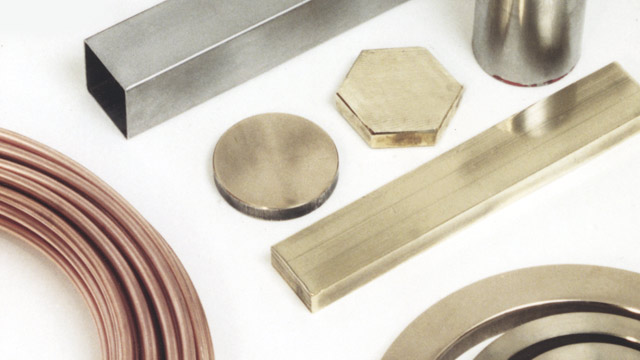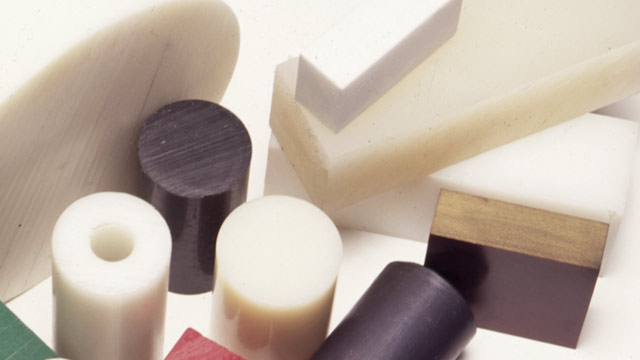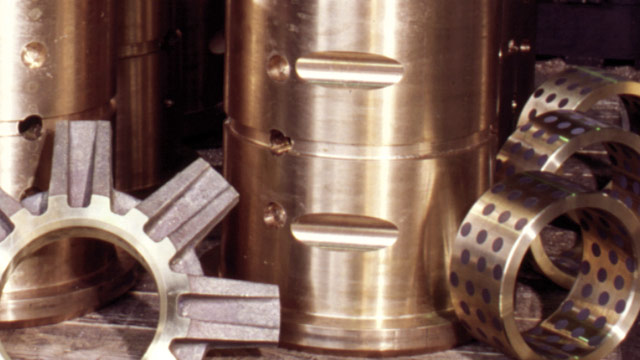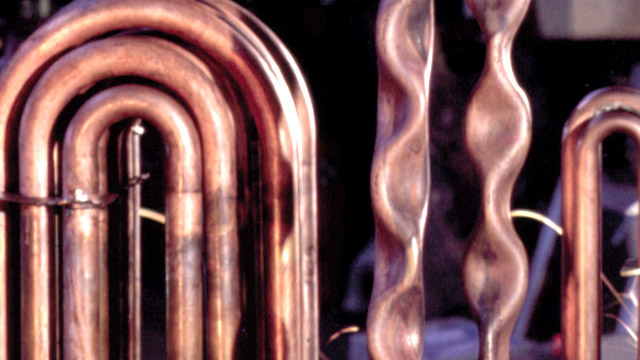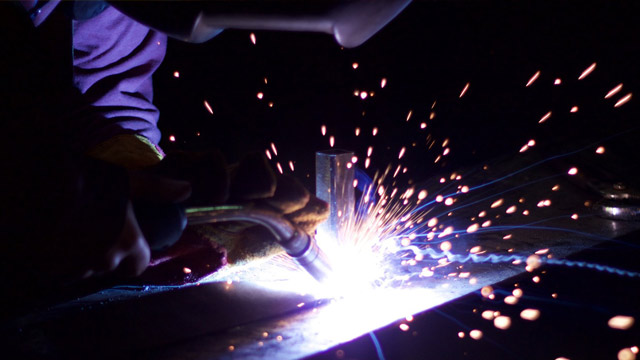MMMulti-Metal Types & Alloys
Click each heading for more information about the types of Multi-Metals we have in stock. For specific technical details please visit our Datasheet archive:
SSStainless Steel Alloys
Stainless Steels are iron-based alloys, with around 12% minimum Cr content to prevent rust formation. Stainless Steels are used in a variety of applications - particularly throughout chemical and power engineering, food and beverage industries, transport and architecture. Stainless Steels are often classified by micro-structure and are generally known as Austenitic, Ferritic, Martensitic or Duplex. A fifth member of the family is Precipitation-Hardened or PH Stainless Steels, defined by the type of heat treatment used, as opposed to microstructure.
Fabricast's stockholding and processing covers a wide range of sections; plate, sheet, strip and bar, tube and fittings and are generally available in the following materials:-
Austenitic Stainless Steels
Ferritic Stainless Steels
Martensitic Stainless Steels
Duplex Stainless Steels
Precipitation Hardened (PH) Stainless Steels
Austenitic Stainless Steels (BS970/EN 1088-3)
303S31 (1.4305), 304S31 (EN1.4301/6), 304S11 (EN1.4307),316S31 (EN1.4401), 316S11 (EN1.4404), 320S31 (EN1.4571), 316S13 (EN1.4435)
This is the largest and most commonly-used family member, offering good formability, excellent corrosion resistance and increased strength when cold worked. Indeed this material can be hardened by cold working, but not by heat treatment and although non- magnetic in its annealed condition, cold working may cause it to be slightly magnetic.
Austenitic Stainless Steels can be divided into two standard grades (covered by AIS Series 200 & 300) and non-standard grades (including modified versions of the 200 & 300 series, together with higher alloyed Austenitics, Superaustenitic and Valve Steels).
300 SERIES covering the largest category of Stainless Steels are chromium-nickel based (18%Cr - 8%Ni). The basic formula is modified to improve corrosion resistance.
These include:-
- Addition of molybdenum to improve pitting/crevice corrosion resistance
- Reduction in carbon content to reduce intergranular corrosion in welded materials
- Addition of nickel & chromium to improve strength and high temperature oxidisation resistance
- Addition of nickel to improve stress-corrosion cracking resistance
200 SERIES frequently termed as the low-nickel equivalents of 301 & 302, such alloys were popular in the 1950's due to the short supply of nickel. Fabricast maintains large stocks of the 300 Series alloys. Material is available in many forms, sections and extrusions with full cut to size facilities including billeting, profiling and forming.
Ferritic Stainless Steels (BS970/EN 10088-3)
Ferritic Stainless Steels 430S17 (EN1.4016) are iron-chromium alloys with body-centred cubic (BCC) structure. Chromium content is usually 11% to 30% and some grades contain aluminium, nickel, niobium, molybdenum and titanium, with selenium and sulphur also added for machinability. Ferritic alloys are ferromagnetic. They have good ductile and formable characteristics. High temperature strengths are not as good as Austenitic Steels. Limited low-temperature and heavy-section toughness. Ferritics cannot be strengthened with heat treatment and not often by cold working as ferrite strain-hardening rates lower ductile character.
Available in:-
Standard 400 series and modified alloy versions.
These generally contain 11 - 27% chromium, 0.08 - 20% carbon and small amounts of
ferrite stabilisers such as aluminium, niobium and titanium.
Low-Interstitial Content (low carbon/nitrogen) grades containing up to 30% chromium, up to 4% molybdenum and up to 2% nickel. Referred to as Superferritics due to excellent stress/corrosion cracking (SCC) resistance.
Martensitic Stainless Steels (BS970/EN 10088-3)
Martensitic Stainless Steels 410S21 (EN1.4006), 416S21 (EN.4005) 431S29 (EN1.4507) are similar composition to Ferritics, but higher carbon/lower chromium permits hardening by heat treatment. Broadly Fe-Cr-C alloys with body-centred tetragonal (bct) crystal structure. They are ferro-magnetic and resist corrosion only in mild environments. Martensitics are similar to plain carbon or low-alloy austenitised steels that are hardened by quenching and tempered for ductility and toughness. This alloy has a chromium content in a 10.5% to 18% range and carbon content which can exceed 1.2%. The chromium and carbon content balance ensures martensitic structure. Niobium, silicon, tungsten and vanadium additions modify tempering effects after hardening. Improved anti- corrosion and toughness is achieved with nickel and molybdenum additions; limited to smaller amounts to ensure martensitic microstructure. Machinability is improved by sulphur and selenium additions. Ideal for applications where good tensile, creep, fatigue strength, moderate anti-corrosion and heat resistance to 650ºc (1200ºF) are required.
Martensitic Stainless Steels are available in:-
Standard 400 series, containing 10.5 - 18% chromium, up to 1.20% carbon and
small amounts of manganese and nickel
Non-standard grades including free-machining and heat-resistant grades as well as those for gears and bearings
Duplex Stainless Steels
Duplex Stainless Steels are two-phase iron-chromium-nickel system alloys, having approximately the same amount of face-centred cubic (fcc) austenite and body-centred cubic (bcc) ferrite, with 20 - 30% chromium, 4 - 8% nickel, characterised by their low carbon content, with molybdenum, nitrogen, copper and tungsten additions. Some of the higher alloy, more anti-corrosive grades are termed Superduplex Stainless Steels.
Most are referred to by UNS number, or their alloy contents, (eg, 2507 is an alloy of 25% chromium and 7% nickel).
Duplexes offer several advantages over austenitics;
Higher resistance to chloride stress - corrosion cracking, excellent resistance to pitting and crevice corrosion and twice
the strength.
Achieving sound welds - a traditional problem with Duplex Stainless Steels -
is ensured by defining correct parameters and chemistry.
For further details please contact Fabricast Technical Support.
Precipitation Hardened (PH) Stainless Steels
Precipitation Hardened Stainless Steels are chromium-nickel alloys containing elements such as aluminium, copper or titanium, allowing hardening treatments. Subgroup classifications; Martensitic, Semi-Austenitic and Austenitic PH Stainless Steels are referred to by tradenames or UNS numbers.
PH Stainless Steels have good anti-corrosion properties and high strength-to-weight ratios, making them ideal for aircraft, aerospace and defence applications.
Available in Martensitic 630 series, 17-4 PH (UNS-S17400). Of all the PH alloys, Martensitic is the most popular, with the 17-4 grade being the most commonly used.
For further details please contact Fabricast Technical Support.
AlAluminium Types
Aluminium has; high strength to weight ratio, formability, corrosion resistance, good conductivity of heat and electricity, flame will not surface-spread across mill or anodised aluminium, is recyclable. Fabricast stocks Aluminium in a variety of forms:-
Aluminium Round Bar - BS1474 from 3/16” dia to 16” dia
Aluminium Sheet - BS1470 10 SWG to 20 SWG
Aluminium Plate - Plate from 4mm to 200 mm - Patterned Plate
Aluminium Extrusions - BS1474 Angles, Flats, Tubing, Hexagons, Tees, Channels, Box
Section, Square, Fittings and Specials
Aluminium Castings - Fabricast’s flexible foundry service offers the option of proofs and
castings or full machining and finishing in a variety of alloys to meet customer specifications
With cutting to size, nationwide delivery, expert technical advice & globing sourcing, for exacting needs, Fabricast is your one stop shop.
GSGeneral Steel Alloys
Fabricast Multi-Metals is a major stockist and distributor of a wide range of General Steels
Black and Bright Steels
Various grades available in the following forms
- Sheets
- Hexagons
- Rounds
- Tube
- Angles
- Fittings
- Channels
- Wire in a range of gauges
- Flats
Mild Steel
With cutting to size, nationwide delivery, expert technical advice & global sourcing, for exacting needs, Fabricast is your one stop shop.
CuCopper Types
Commonly referred to as pure copper, this material is used in a variety of commercial applications and is sometimes specified as 99.9% pure. Whilst the strength of copper is low by comparison to other materials, it can be significantly enhanced by work hardening. The versatility of copper lends itself to a wide range of applications, from electrical conductivity to decorative, architectural, general engineering and welding applications. Fabricast maintains a good selection of copper materials in many forms, including:-
Copper C101 (Electrolytic, high conductivity)
Used for conductors and fabricated electrical components. Fabricast offers the following:-
Rods & Sections (BS2874 C101) BSEN 12163/4/7 CW004A
Sheet (BS2870 C101) BSEN1172 1652/3/4 CW004A
Plate (BS2875 C101) BSEN1652/3 CW004A
Copper C106 (Phosphorous deoxidised, non-arsenical)
Used widely in the chemical and general engineering industries where high electrical conductivity is not required. Excellent for brazing and welding applications. Fabricast offers the following:-
Rods & Sections (BS2874 C106) BSEN 12163/4/7 CW024A
Sheet (BS2870 C106) BSEN1172 1652/3/4 CW024A
Plate (BS2875 C106) BSEN1652/3 CW024A
Tube (BS2871 C106 pt3) BSEN12449 CW024A
For further details and stock availability please contact Fabricast Technical Support.
CuZnBrass Alloys
Brass - Covering numerous chemical and mechanical compositions, Brass offers an ideal choice of alloy owing to its general versatility within a wide range of industries.
Fabricast stocks and maintains a large selection of Brass alloys with materials readily available in many forms including:-
Common Brass
Additional tin content improves corrosion resistance, especially in seawater and similar Frequently termed “Common Brasses” this material provides excellent machining and wearing properties, and affords good corrosion resistance and conductivity. Fabricast stocks several sections, readily available in:-
Brass (BS2874 CZ121) BSEN12163 CW614N
Extruded solid bar, Hollow Bar, Angle, Flats, Hexagons, Squares, Channel and “T” section.
Brass (BS2870 CZ108) BSEN1652/3/4 CW508L Sheet and Shim
Brass (BS2875 CZ108, Naval CZ112) BSEN1652/3 CW508L, Naval CW712R Plate
Brass (BS2873 CZ108) BSEN12166 CW508L Wire
Brass (BS2871 CZ126) BSEN12449 CW707R Tube - drawn thin wall, coil and straight
lengths
Naval Brass
Additional tin content improves corrosion resistance, especially in seawater and similar marine conditions. Offering less machinability than the common brasses, this material is ideally suited to marine and heavy duty based applications. Fabricast stocks several sections, readily available in:-
Naval Plates (BS2875 CZ112) BSEN1652/3 CW712R
Naval Round Bar (BS2874 CZ112) BSEN12163, CW712R Sheet and Shim
Other sections are also available on request. For further details on this range and stock availability please contact Fabricast Technical Support.
High Tensile Brass (Manganese Brass/Bronze)
Also known as “Manganese Brass or Bronze” this provides significantly higher strength than the standard family of brasses. Resistance to corrosion is further increased owing to the addition of aluminium. These properties provide ideal solutions to heavy-duty applications.
High Tensile Brass is available in the following sections:-
HTB (BS2874 CZ114) BSEN12163/4/7 CW721R Extruded Round Bar
Other sections are available on request. For further details please contact Fabricast Technical Support.
CuSnBronze Alloys
A copper tin based alloy offering strength and hardness for many engineering applications. Fabricast maintains large stocks of alloys within the Phosphor Bronze, Aluminium Bronze and popular SAE660 ranges.
Material is available in many forms and includes:-
Phosphor Bronze (BS1400 BSEN1982) Continuous Cast Bar
PB1 (CC481K)
High tin alloy used in load bearing applications where strength is generally required. Can be used for bearings, gear wheels, springs and general engineering mechanical requirements
PB2 (CC483K)
Higher tin content than PB1 improving wear resistance. Used for gears and general bearings where rigidity is required
LG2 (CC491K)
Lead based alloy offering a combination of corrosion resistance and moderate strength with good machinability. Applications include valves, pumps, bearings and marine based products
For further details on this range and stock availability please contact Fabricast Technical Support.
Phosphor Bronze (PB102 BSEN12163) Extruded/Drawn Bar PB102 (CW481K)
Low tin based alloy providing high strength and corrosion resistance/fatigue. Applications include springs, instrument components, fasteners and fixings.
Phosphor Bronze (BSEN1652/3) Plate PB102 (CW451K)
Low tin based alloy providing high strength and corrosion resistance/fatigue. Used for condenser tube plates and vessels where higher strength and corrosion resistance than pure copper is required.
For further details on this range and stock availability please contact Fabricast Technical Support.
SAE660 (ASTM B271 1996A C93200)
Medium hard material with reasonable high abrasion resistance and moderate emergency running properties. Suitable for normally stressed sliding bearing bushes and brasses when shafts of general structural steels as well as surface hardened steel are used. Employed for certain locomotive axle bearing bushes, coupling rod bearings and sliding bearing bushes for general machine construction. Resistant to seawater. Fabricast stocks an extensive range of SAE660 sizes in both cored and solid bar form, with a cut to size facility. Please contact our sales team for a full stock sheet.
Aluminium Bronze Rounds, Sections and Plates
Copper based alloy with added Aluminium providing excellent corrosion resistance with high strength and offering good weldability. Used for valve and pump components, tube plates and marine condensers.
For further details please contact Fabricast Technical Support.
FeCast Iron Types
Fabricast Multi-Metals stock Cast Iron in the following forms;-
- Square
- Rod
- Rectangle
All to BS1452 - in various categories and grades.
Cast Iron - Fabricast offers a unique cast iron sourcing service from pattern making to finished product, with the option of a sand cast finish, through to proofed or fully machined components in a variety of alloys to meet the most demanding specifications.
With cutting to size, nationwide delivery, expert technical advice & global sourcing, for exacting needs, Fabricast is your one stop shop - "All Materials, One Supplier"
SCSpun Cast
Spun Cast and proof machined available to customer specification please contact us
APAncillary Products
Fabricast stocks a wide range of Ancillary Products including;-
Valves - Gate, Globe, Ball, Butterfly, Plug Cocks in Brass, Gunmetal, Stainless Steel, Screwed & Flanged, Socket Weld & Butt Weld ends
Fittings in Wade, Imperial & Metric sizes - Black or Galvanised Mild Steel or Malleable Iron, Aluminium Brass, Stainless Steel, Copper, Cupro Nickel, Brass, Gunmetal
Hygienic Tube & Fittings - Wide range of valves, fittings and tube for food, brewing, pharmaceutical & chemical industry applications
Filters - Air and Hydraulic application filters supplied to specification
Gauze - Stainless Steel, Brass or other specification needs
Mild Steel - Wire in a range of gauges....Perforated Sheet - Brass or Stainless Steel


